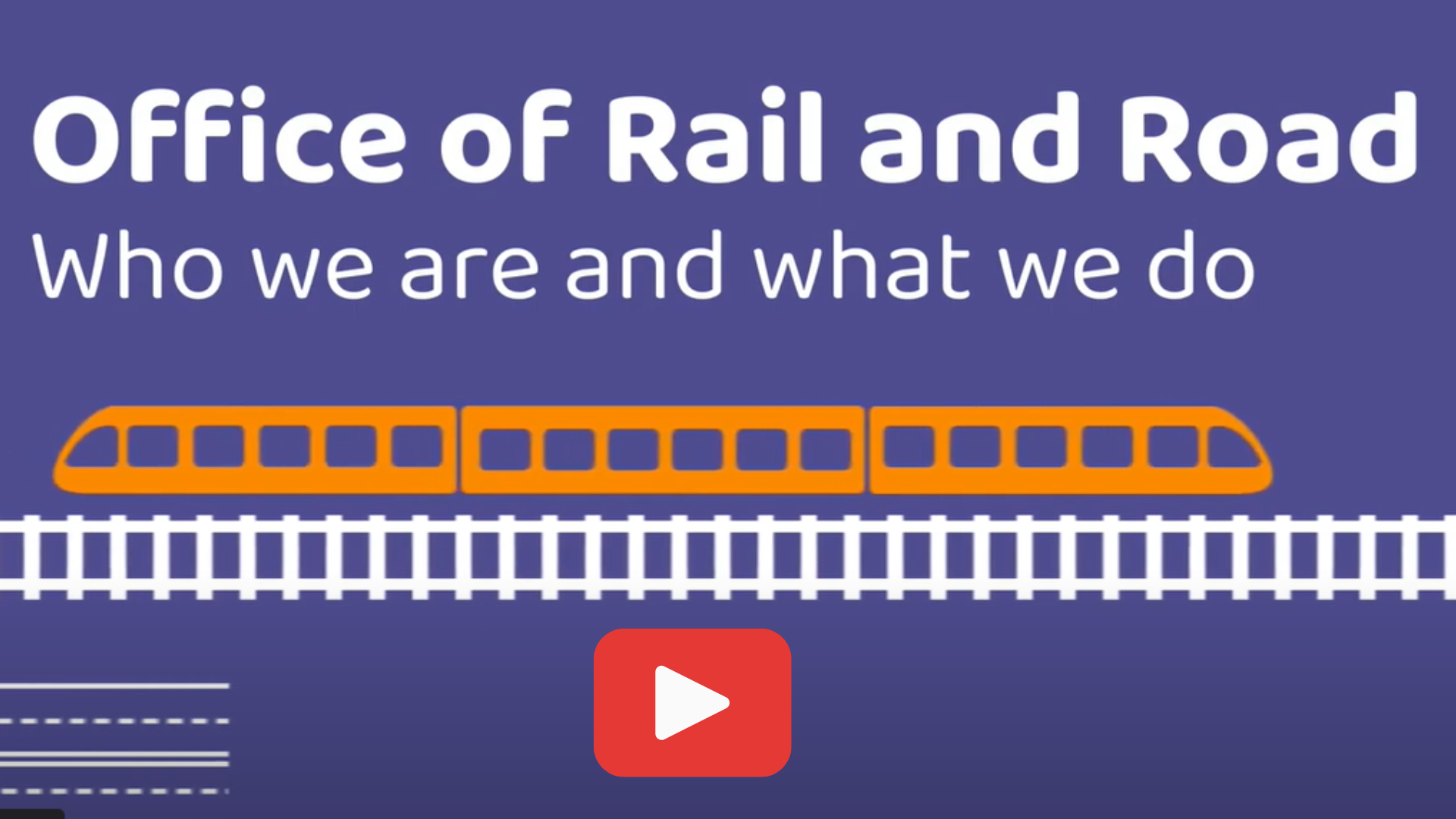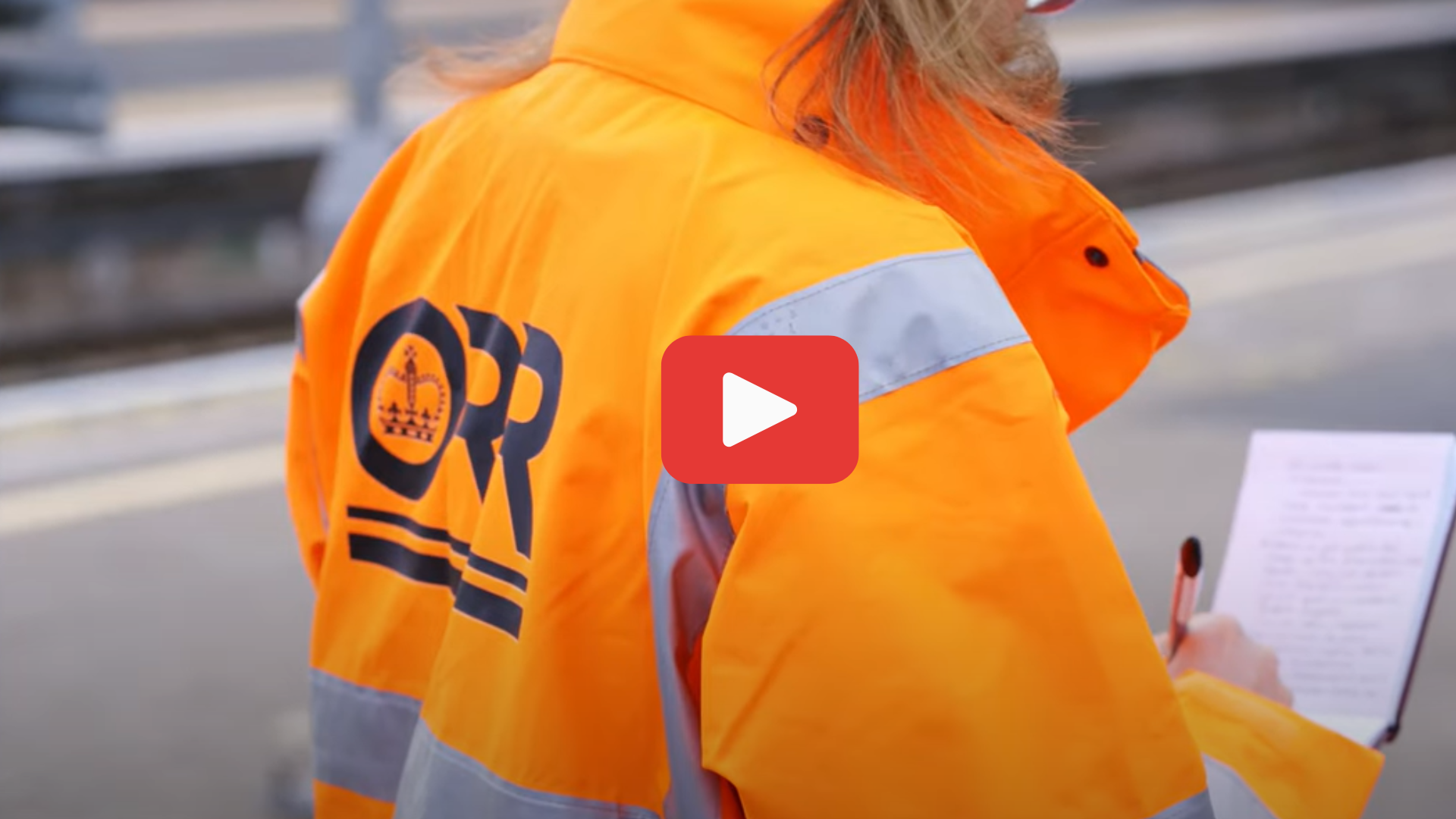We are the independent economic and safety regulator for Britain's railways. We also regulate performance and efficiency on England's strategic road network.
ORR's business plan
Our aim is to protect the interests of road and rail users, and our business plan sets out how we intend to do so.
Our functions
Our safety and economic functions are driven by legislation, and we are accountable to Parliament and the public.
The law and our duties
We operate within the framework set by legislation, and we are accountable through Parliament and the courts.
Who we are and what we do
ORR holds Network Rail and National Highways to account for their performance on Britain’s railways and England’s strategic road network, and for how they spend their money.
ORR authorises new train services and rolling stock; signs off major works at stations; investigates competition issues for users, from the price of station catering to digital signalling; oversees ticketing information; sets standards for accessible travel; license train drivers; requires good information during disruption; track how services run and publish the data; set passenger complaint standards and encourage freight growth. ORR also supervises the safety of local railways like the London Tube, Tyne & Wear Metro, Glasgow Underground, and all Britain’s tramways, and heritage railways.
On the roads we are responsible for regulating the performance and efficiency of National Highways to maintain, renew, operate and improve the motorways and main 'A' roads in England. We also advise government on the appropriate level of funding and performance requirements for the future.
We take a pragmatic and collaborative approach to regulation across the industry, helping shape a future where people and goods move efficiently and safely.
Watch the animation and download our infographic for an overview of ORR's role.

Animation transcript Collapse accordion Open accordion
The Office of Rail and Road is the independent economic and safety regulator for Britain's railways and the monitor of performance and efficiency for England's strategic road network. We hold Network Rail and High Speed One to account and we make sure that the rail industry is competitive and fair.
We protect the interests of passengers and have other economic regulatory functions. We regulate health and safety for the entire mainline rail network in Britain, as well as London Underground, light rail, trams, and the heritage sector. We hold Network Rail to account for delivering performance and service, as well as value for money for passengers, the freight industry, and taxpayers. We set the standards that rail companies have to meet in key areas to make sure that passengers can travel with confidence.
We then hold the train companies to account for meeting our expectations. Our focus is on areas that are important parts of the passenger experience: passenger information, accessible travel, ensuring that everybody is able to travel, including those who need assistance, ticketing and passenger rights.
We ensure passenger and freight train operators have fair access to the rail network.
We also license train companies and play a key role in enforcing competition and consumer law across the industry.
We regulate the High Speed One line between St Pancras and the Channel Tunnel, holding HS1 to account for its performance, service, and value for money for passengers and the freight industry.
Our job as highways monitor is to ensure that National Highways delivers its major programme of investment and other performance commitments.
We hold National Highways to account for achieving efficiency savings and providing real value for money.
We work closely with Transport Focus and National Highways to understand road users' priorities and make sure the road network meets their needs.
Working across Britain
Our staff work from six offices across Britain, giving us the flexibility and coverage we need to perform our functions efficiently.
Many of our people work away from the office, for example by conducting on-site inspections across the rail network.
Watch the video to meet some of our team and learn more about our work.
Video transcript Collapse accordion Open accordion
Errol Galloway, HM Principal Inspector of Railways
ORR is actually the regulatory body, the enforcing authority for health and safety on the British Railways.
If you think of HSE, we are literally the HSE of the Railways.
Kathryn Gibb, HM Inspector of Railways
We'll go out and we'll inspect various we call them duty holders, but they're basically railway companies, like train operating companies.
We look at what we think are the biggest risks in an organisation and then we'll base our inspections around those risks.
Monica Babb, HM Inspector of Railways
The work that we do gives people confidence to be able to use the railway, the fact that we are liaising regularly with the dutyholders to understand what they're doing and how they're working.
Feras Alshaker, Director of Planning & Performance
Beyond the mainline railway, ORR regulates non mainline Railways, so trams subsurface systems like the London Underground or the Glasgow Metro, and Heritage Railways as well.
Steve Turner, HM Principal Inspector of Railways
Heritage Railways have their own separate legislation called ROGS, which is the Railways and Other Guided Transport Systems regulations, which apply to the mainline, but in terms of heritage Railways, they have to have a proportionate safety management system for their particular operation.
Feras Alshaker, Director of Planning & Performance
We hold to account National Highways, that operates the motorways and main A roads in England.
Louise Butcher, Senior Highways Policy Adviser
Our job is to hold National Highways to account for delivery against the road investment strategy. It's to make sure that it's delivering against the requirements of its licence, and it's to make sure that it's delivering all of this as efficiently as possible.
Haydn Gill, Senior Performance Analyst, Highways team
We have pushed on a lot of performance issues, maintenance, renewals, make sure that the roads that are getting resurfaced are the ones that need resurfacing the most, that they are the right asset at the right time.
We've pushed very hard to sort of increase data on the network, so making sure that we're doing the best that we can for road users.
Lyndsey Melbourne, Head of Information and Analysis
We are the accredited primary producer of rail industry official statistics.
Our published statistics provide users with the latest results and trends in a range of key areas for the rail industry.
Peter Moran, Business Intelligence Manager
We publish all of our statistical outputs on the data portal. That's a one stop shop for all of our rail statistics, we publish data tables, infographics, statistical releases, interactive charts.
Muhammad Hashir, Business Intelligence Developer
The beauty of dashboards are that they are much more easier to use. It's visually comparable year to year or month to month or quarter to quarter.
Jacqui Russell, Head of Consumer Team
Our job is to set the standards that rail companies have to meet.
- First of those is around passenger information.
- Second, around accessible travel, ensuring that everybody is able to travel, including those who need assistance.
- Third is around ticketing and access to refunds.
- And finally, just in case things go wrong, complaints handling and redress.
Sam McClelland Hodgson, Network Regulation Manager
We hold Network Rail to account for the performance and services that it said it would deliver, as well as for what it said it would deliver it for the funding.
Esther Sumner, Head of Access Reform Delivery
The network for our system operator is one of the national functions that Network Rail has.
It deals with lots of stuff that's happened to think is really important and you experience every day, but you probably don't really think about, so:
- what the timetable is how trains access the network;
- the forward planning that happens about how the Railways should develop;
- and it also deals with rates, customer information, national passengers and kind of network operations issues.
Cherry Lam, Civil Engineer – Engineering and Asset Management
As a server engineer in or the main aspect of our work is to monitor and holding Network Rail to account on managing, maintaining, renewing the infrastructure assets.
Rail network is technically complex and challenging in that you plan, build and maintain network around existing constraints while minimising the impact to the public.
Ollie Stewart, RAIB Recommendation Handling Manager
The Rail Accident Investigation Branch investigates railway accidents and near misses and then may make recommendations and it is the responsibility of ORR to decide who should act upon those recommendations and how they should be acted upon as well.
Justin McCracken, Deputy Chairman of the Board
I think the greatest value that ORR brings is our ability to provide impartial commentary and put material out into the public domain that will benefit from public scrutiny.
Madeleine Hallward, Chair of the Highways Committee
Too often there's a disconnect in the way that we think about passengers and people who are travelling around both rail and road, and ORR has a very different perspective from lots of other bodies because it has a much more comprehensive oversight.
Declan Collier, Chairman of the Board
The rail and road sectors that we have responsibility for are going through some pretty challenging and changing times.
We've been at the centre in particular of the discussions that have been taking place around the rail reform programme and the role that we will play in the future I think is really exciting.
You'll see the role that we do moving more from the traditional type of regulator's role to one in which we are expected to provide oversight of what's happening within the sector.
But also we'll be providing assurance to the government and the funding organisations that the aspirations that they have for the strategic road network and the rail sector to deliver for the consumer for the passenger and the road user is actually delivered.


